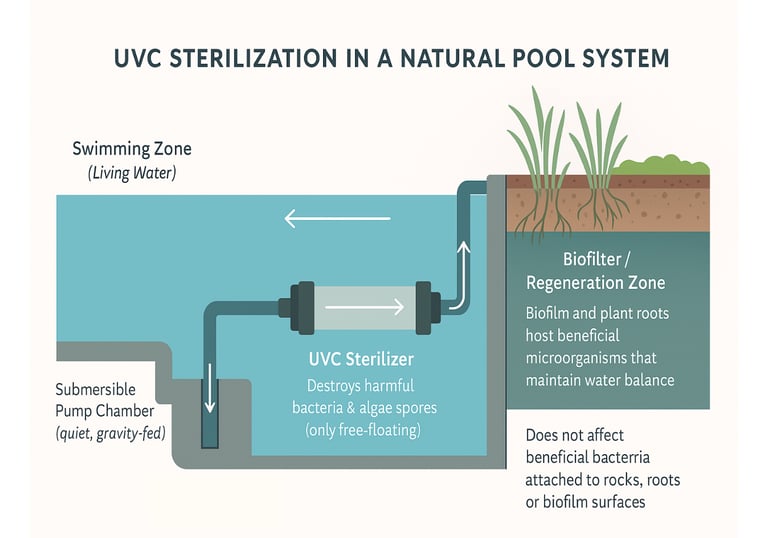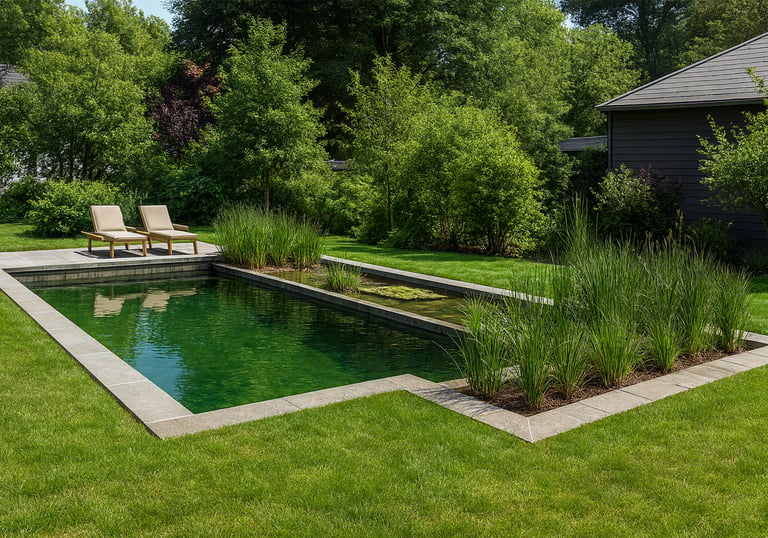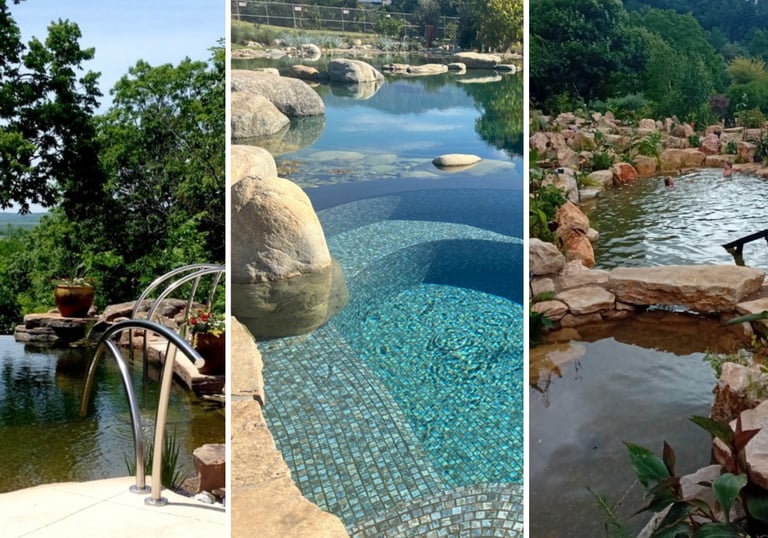Benefits of Converting Your Chlorine or Salt Pool Into a Natural Pool | Aqua Vitae Guide
Convert your chlorine or salt pool into a natural pool with softer, chemical-free water, healthier swimming, and up to 70–90% lower electricity and maintenance costs.
8/18/20254 min read
Benefits of Converting Your Chlorine or Salt Pool Into a Natural Pool
Experience cleaner water, healthier swimming, and dramatically lower energy costs — all with the elegance of living, chemical-free design.
A natural pool conversion replaces harsh chemical treatment with a living, self-balancing filtration system inspired by nature. Instead of chlorine, stabilizer, acid, and aggressive salt cells, the water is purified biologically — through beneficial bacteria, oxygen-rich circulation, and natural filtration processes. The result is softer water, healthier swimming, and dramatically lower electricity consumption. For many homeowners, this upgrade reduces annual operating costs by 70–90% and eliminates the chemical irritation, odors, and long-term wear associated with chlorine- and salt-based pools. Converting your pool isn’t just about going natural — it’s about creating a better, safer, and more efficient way to swim.
What’s the Difference Between Natural, Saltwater & Chlorine Pools
A chlorine or saltwater system produces chloramines — the compounds responsible for red eyes, itchy skin, unpleasant odors, and respiratory irritation.¹ Even “saltwater pools” are chlorinated pools in disguise; the salt cell generates chlorine continuously. Natural pools, however, rely on biological filtration that supports clean, clear, oxygen-rich water without chemical byproducts.
What swimmers experience:
No burning or stinging eyes
No itchy or dry skin after swimming
No chemical smell or residue
No chloramines, no stabilizer buildup, no shock treatments
Safe for children, sensitive skin, pets, and wildlife
A gentle, freshwater feel more similar to a spring or lake
For families, this is often the number-one reason to convert. The water simply feels better — and the body notices immediately.
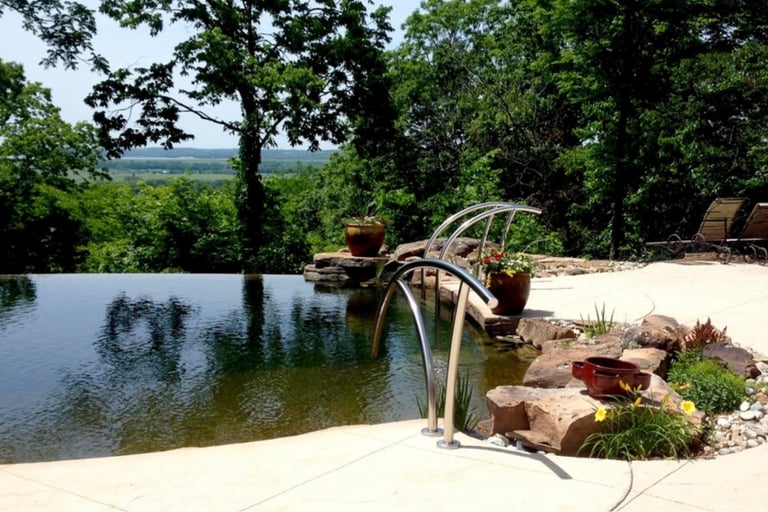

Health Benefits — Softer Water, No Harsh Chemicals
Electricity Savings — 70% to 90% Lower Energy Use
Traditional pool systems rely on high-pressure pumps, sand filters, and salt cells that consume large amounts of electricity. Natural pool systems operate very differently: they use high-efficiency pumps running at low pressure, designed for biological circulation rather than brute-force sterilization.
Where the savings come from:
No high-pressure filtration
No salt cell or chlorine production
Lower flow resistance = dramatically reduced wattage
Pump operates at low, steady speeds
Biological filtration accomplishes the “work” instead of electricity
Many homeowners see a 70–90% reduction in electricity use after conversion.
In warm climates such as Portugal — where pumps run year-round — this is a major financial shift.
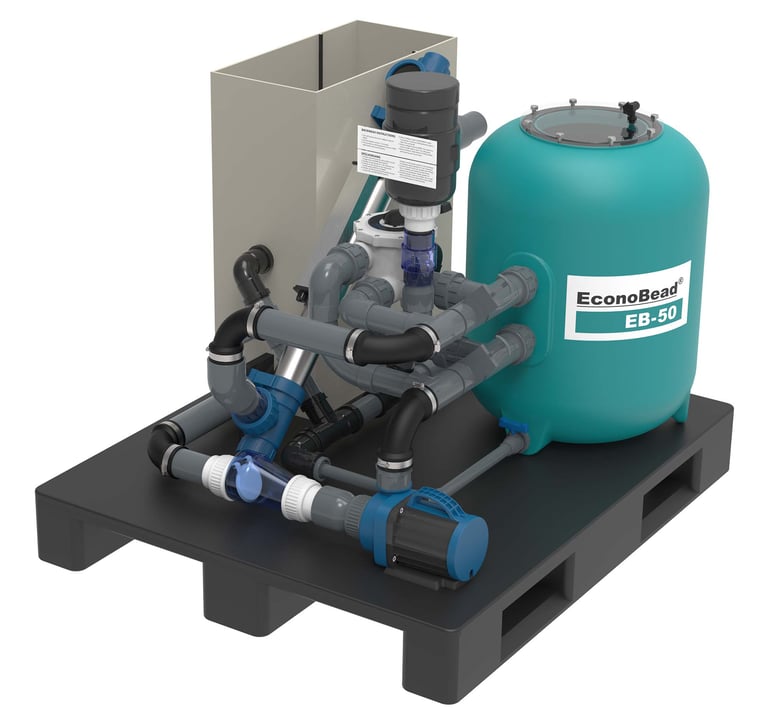

Lower Maintenance & Equipment Longevity
Chlorine and salt systems create ongoing wear:
Corrosion on metal fixtures
Damage to stone, plaster, and surrounding surfaces
Accelerated pump and heater degradation
Regular equipment replacement
Continuous chemical balancing and testing
A natural system eliminates chemical strain and operates at gentler pressures, extending equipment life and reducing annual maintenance costs. Homeowners often report fewer repairs, fewer unexpected breakdowns, and far less time maintaining the system.
Ongoing savings include:
Zero chemical purchases (chlorine, stabilizer, acid, salt bags, algaecides)
Extended equipment lifespan
Less surface and tile damage
Fewer service calls
The entire maintenance routine becomes simpler, cleaner, and more predictable.
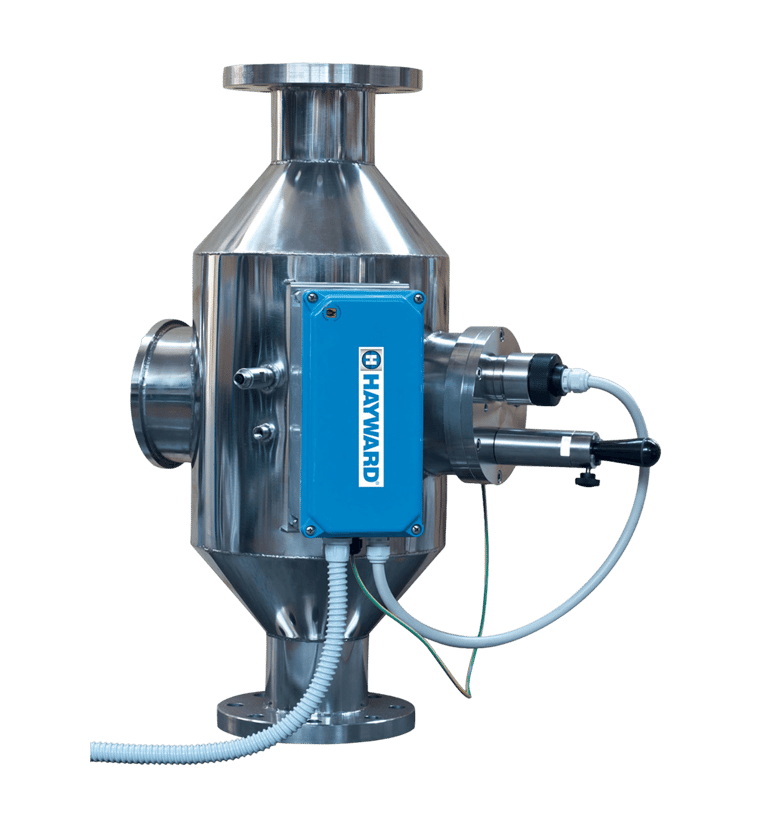

While not the primary driver for most clients, natural pools offer meaningful environmental advantages:
No chlorine or chemical discharge into soil or drainage
No salt corrosion runoff damaging gardens or hardscapes
Lower carbon footprint from reduced electricity consumption
Water stays biologically active rather than chemically sterilized
Safe for birds, pets, insects, and surrounding ecology
This makes natural pools ideal for homes surrounded by gardens, pets, wildlife, or natural landscapes. For many households, the environmental benefits become a welcomed bonus once the system is installed.
Environmental Benefits Cleaner Water, Lower Impact
Insurance Benefits Lower Risk Profile
While insurance policies vary by country and provider, chemical pools carry certain risks that may affect premiums or liability considerations:
Chemical storage risk: Homeowners are responsible for storing potentially hazardous chemicals (chlorine, shock, acid). Natural pools eliminate this category entirely.
Corrosion-related failures: Salt and chlorine accelerate material degradation, sometimes leading to leaks, equipment failures, or structural damage — all of which can trigger claims.
Reduced chemical injury risk: Eye irritation, chemical burns, accidental inhalation, and poolside spills are liabilities associated with traditional pools.
Natural pools remove nearly all chemical-related risks, which can simplify coverage and may, in some cases, reduce premiums or eliminate add-on chemical hazard riders.
(Note: Insurance savings vary by provider. Always confirm with your insurer.)
A More Enjoyable Swimming Experience
Beyond health, cost, and environmental advantages, natural pools deliver something that chemicals never can: a more beautiful, enjoyable, and calming experience.
Clear, refreshing, freshwater swimming
No sticky residue on skin
No bleaching of hair or swimsuits
No chemical smell on the body
A more peaceful, natural aesthetic
Water that feels alive, not manufactured
Clients routinely describe the water as softer, lighter, and more relaxing.
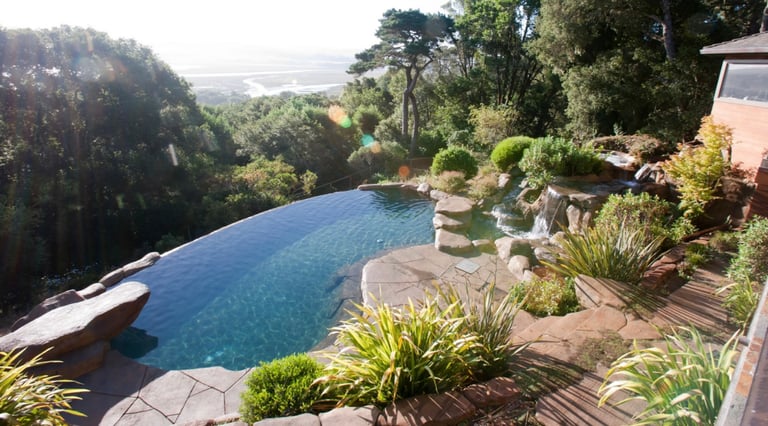

The Modern Way to Swim
A natural pool conversion brings together the best of modern design, environmental intelligence, and biological engineering. It offers a healthier, more efficient, and more enjoyable alternative to traditional pool systems — without requiring a complete structural rebuild.
For many homeowners, converting from chlorine or saltwater is not just a choice — it’s an upgrade to a better quality of life.
You may also like...
UV Sterilization for Natural Swimming Pools | Aqua Vitae
Learn how UV-C sterilization for natural swimming pools can ensure year round chemical-free, crystal-clear water that’s safe, clean & eco-friendly; naturally.
Why Most Natural Pools Don’t Look Natural | Aqua Vitae Guide
Many natural pools miss the mark. Discover why — and how Aqua Vitae designs truly naturalistic pools using a method refined over 25 years.
Explore styles and various features for creating your dream natural pool, pond or water‑feature. From design inspiration to filtration, plants and aesthetic detail.
Design Your Dream Natural Pool – Styles & Features | Aqua Vitae Guide
Living water, by design.
© 2026 Aqua Vitae. All rights reserved.
Offices
Lisbon, Portugal
San Francisco, California



